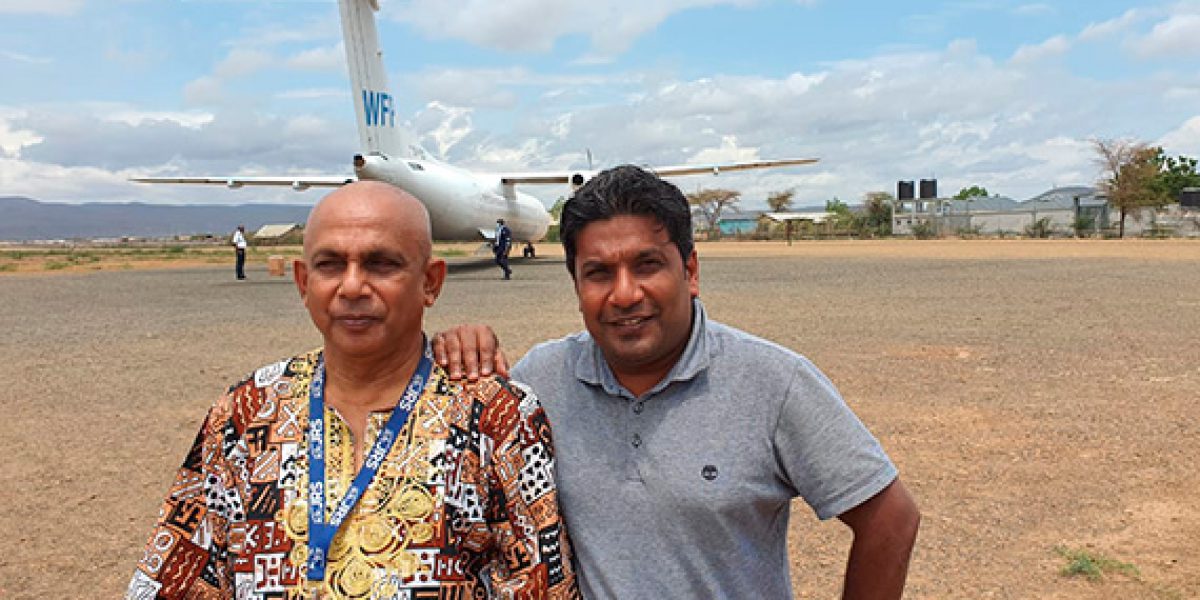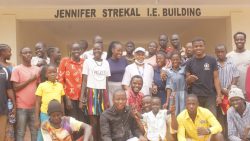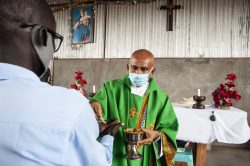
Learnt lessons from Kakuma
After completion of my mission in JRS Kakuma, back in Nairobi, I was reflecting and relishing my experiences in Kakuma for past around four years. My main thrust was, “What did I do or what did I contribute to the lives of refugees over there?” My recent meeting with Deogratius Rwezaura, the Rector of Hekima University College, raised a very inspiring thought, “What did the refugees teach you during these years?”
Really, it was a school of training for me. I was a student and our refugee brothers and sisters and even children with severe disabilities were my teachers. These days I am fascinated reading the book by Gerald O’Collins “The beauty of Jesus Christ: Filling out a Scheme of St. Augustine” The chapter on “Beautiful under the Scourges, Beautiful on the Cross” gave me a boost to pen down these reflections through the eyes of pain, hopelessness and great resilience of our refugees.

The context of our refugees in Kakuma & Kalobeyei
At present there are about 250,000 refugees in Kakuma camp and Kalobeyei settlement mainly from South Sudan, Burundi, DRC and Somalia. The camp is around for thirty years and some have born in Kakuma and do not know their own countries. Yet every month, there is an influx of refugees around 3000. It is not a direct fleeing from their land to be exiled in Kakuma. Most of them travel from country to country searching for place of peace and security. Their journeys are marked with utter suffering; pain and great hardship among them the women, girls and children are most vulnerable. Even after reaching the camp, they are enclosed in the reception for weeks and months for registration and to facilitate their shelter in the camp. The UNHCR and the other humanitarian Agencies provide food, medical care, education up to secondary level (even there are agencies provide Post secondary education, Teacher Trainings and tertiary education including JRS) , cash empowerment, and livelihood opportunities. Yet, the life in the camp is marked with various deprivations, lack of facilities, and movement out of the camp (highly monitored if so), for special medical care and regular tension within the communities.
During Sunday worship, all the Mass centres are filled and if the service is scheduled for 9.30 am, they will be gathering from 7.30 am onwards. What a difficulty we had to control the congregation during the pandemic? Even during the pandemic, they were not afraid. There were several occasions, they confronted me saying, “Father, you are scared but we are not. The God, who protected us in our long – hard journeys to Kakuma from our fleeing countries, will surely protect us. We are not afraid”. Then they will add, “You do not trust God and God’s power”. What a challenge we had to conscientize them for vaccination and covid prevention protocol. That is not merely their negligence but mainly their deep trust in God.
Their great trust in God is shown even when we visit their homes or patients in the hospitals. They love to pray and request for prayers. As we leave them, they will plead us to pray for them even our Islamic friends.
What gladness and rejoicing is connected with their singing during worship. Could we imagine refugees who have escaped death and threats are loudly singing and dancing? Some of them are victims of great violence and abuse.
The secret of all these signs are their deep trust in God. They feel the need of God and they have the experiential knowledge of God’s care and protection.
The second lesson taught by these refugee friends is their affectionate response to those who care for them and serve them. These are persons who have gone through and undergoing immense suffering, pain and violence. With great admiration, I recall our refugee teachers who are involved in our schools for children living with disabilities. Yes, I was close to them and cared for them with an attentive ear & eye to see their challenges and respond to them. As the Head of Sub Office of UNHCR Kakuma commented on my farewell, “Whenever you stand at our meeting with Heads of Agencies, we were sure you are raising the challenges of the refugees and not on your agency. You connected their heart beat with UNHCR”.

Their responses to even for tiny deeds you do with love and concern are remarkable. During Sunday Masses, I ask them, “What are the things you like to remember happened during the week to thank God”. The immediate responses are that we thank God for our teachers, we thank God for LWF, FCA and Windle International for providing us teachers, we thank God for WFP for food supply, we thank God for NRC for water etc…
I have witnessed these beautiful gestures during these four years but intensified during my final days in Kakuma. The refugee staff, the youth from Vjana Twaweza group which JRS motivated for fishing in the dessert, the members of Church groups, the altar servers, the persons whom we supported through other agencies and even old ladies who came to my office to bid me farewell with great emotions were a true witness to their strong gratuitous affection. Some even brought expensive gifts also cocks.
They are grateful even for a smile, a few words of an informal chat, a text book and even a corrective advice.
This attitude of affectionate gratitude midst of all pain really touched my life.
The strong sense of resilience is the third lesson taught by them. These are men and women gone through unexpressionable violence and pain. These are the persons who have children with disabilities mainly because of lack medical care and malnutrition. The schools are so congested with the ratio of one teacher for around 110 students. The recurring malaria fever, typhoid and prevalent malnutrition due food shortage are some their current main challenges. The long queues to collect water and attention for medical care and administrative work are daily phenomena in the camp. Their long stay in the reception centre is another hustle. Yet with all these scenario, the smiles they have is unimaginable. Even when the children see us, they are the first ones to greet, “How are you” with a great smile.
With this attitude of resilience, they live in hope. When challenges are posed at our staff meetings, limitation of funds are told and even ending contracts due to budget cuts, they respond, “Today is good but tomorrow will be better”. With this unwavering hope, they study hard, work hard, they volunteer to serve the most vulnerable, do their best to qualify in higher studies, and share with one another.
Once when I visited a mother of one of our Vijana Twaweza members, I discovered that there are 12 children at her home. When I inquired about these children, she revealed that she has only 5 children and other seven are adopted ones. The mama added, “In our church I discovered three unaccompanied three children. The other two children were from a single mother who passed away suddenly. There were no relative take care of these young ones. The last additions are the ones brought home by my sons from school. Their mother is a person with disabilities who is unable to care for the education of her sons”.
Spontaneously I checked with her, “You too are a single mother. How do you manage all these children of yours and adopted?”.
With a great smile, she responded, “All are my children. They are not adopted. God gave them. You need to have a very big heart. Great suffering makes our hearts enlarged”. Even today when I recall this conversation, makes me burst int tears.
I totally agree with Gerald O’Collins, I have seen the Beautiful under scourges, Beautiful on the Crucified, and Beautiful on the pierced through my friends in Kakuma Camp.
Yes, I have left Kakuma physically but carry them in my heart yet passionately miss them who taught me so much.
God bless all my refugee brothers & sisters especially children living with disabilities



